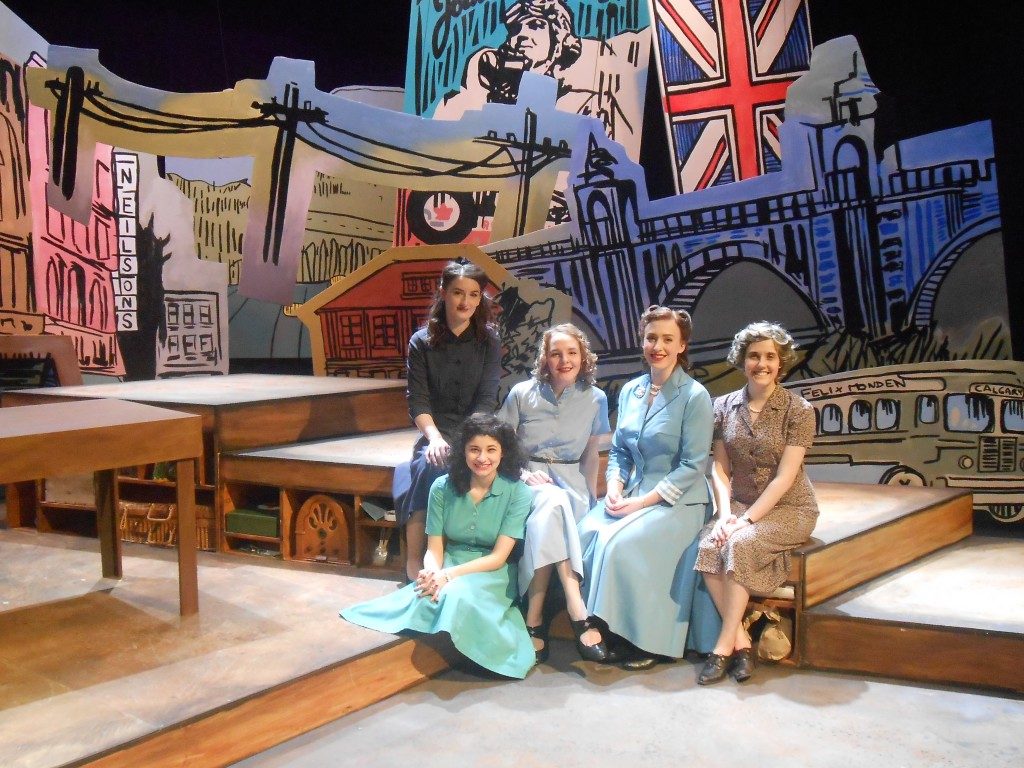
‘Waiting for the Parade’ review
By Cheryl Minns, Contributor
It’s a woman’s world in Douglas College’s production of John Murrell’s Waiting for the Parade. Following the lives of five Calgary women during the Second World War, the play explores the pain, loss, and changing social dynamics that women faced in that era through 24 scenes featuring drama, comedy, and music.
Waiting for the Parade begins with Janet (Shannon Lindsey) ordering the three women in her group—housewife Catherine (Rachel Fournier), young teacher Eve (Pamela Carolina Martinez), and older mother Margaret (Lily Gillette)—to perfectly and promptly roll gauze for the first aid kits being prepared. It is established that Janet is an unkind, bossy leader who has little compassion for the women who work for her. However, it eventually becomes clear that her not-so-perfect home life is what has driven her to her current state. Lindsey does an excellent job at making the audience despise Janet at some moments and then sympathize with her in others, especially in a later scene where she confronts her husband while playing the piano.
Catherine misses her enlisted husband until she realizes that she can live her life without him. She gets a job at a factory to provide for herself and her daughter. She starts seeing another man, despite the fact that she is still married. Fournier gives a particularly passionate performance when Catherine gets her long-awaited moment to tell off Janet and criticize the woman’s rude behaviour. The moment marks Catherine’s change from a passive housewife to an outspoken individual, which Fournier powerfully delivers. Catherine’s evolution captures how women of that era developed a level of independence without their husbands around and were no longer bound to their traditional roles.
“The play is really about the change of the woman’s role in Canadian society,” said Rebecca Troock, who plays Marta. “This was an interesting exploration in noting the differences in going from traditional, conservative women into what we are today.”
Marta, a German-born shopkeeper who immigrated to Canada as a child, struggles to run her father’s clothing shop after he is charged with being a Nazi supporter and detained in a Canadian prison camp. Troock gives a heart-wrenching performance when she argues for her father’s release to the point of tears, as well as when she forcefully stands her ground after Janet tells her not to play German music in her own shop. The discrimination that Marta encounters is a harsh reminder of the prejudice that ethnic groups struggle with when a country is at war.
Although Margaret and Eve’s ages and personalities are drastically different, they both worry about their children—Margaret’s two sons and Eve’s students—and how the war will affect them. Margaret is a pessimist and assumes she’s lost her sons forever when one goes to war and the other doesn’t come home anymore. Eve is an optimist who wants to persuade her students out of joining the war, despite her husband’s disagreement that they belong on the front lines. Gillette’s behaviour and mannerisms make her a convincing older woman on stage, especially during scenes where Margaret tries to hide how ill she is becoming. Martinez’s bubbly personality brings a burst of energy to the play whenever Eve is onstage, adding a lightness to the darker scenes when characters discuss war and death.
Waiting for the Parade will be performed at Douglas College’s Studio Theatre until March 18. Tickets are $10 for students and $20 for adults. Tickets can be purchased at WaitingForTheParade.BrownPaperTickets.com

